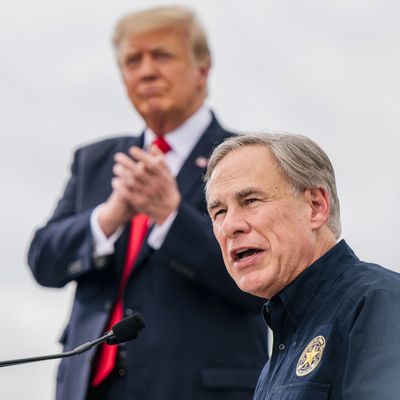
Former president Donald Trump really likes to endorse candidates for office, in keeping with his general determination to share his views on every imaginable subject. According to Ballotpedia, since Trump was elected president in 2016, he has endorsed a total of 408 candidates. This includes candidates at every level of government from potential U.S. senators to state legislators and even one county commissioner. He’s off to a roaring start in 2022 with 98 endorsements so far, all of them conferring his blessing on candidates facing primaries and general elections later this year.
Trump’s motives aren’t hard to infer. First, endorsements are a simple way to keep himself in the news, which isn’t a given thanks to his permanent ban from Twitter. And second, at least when it comes to primaries, it’s an easy way to illustrate his grip on the GOP and to intimidate Republicans who might otherwise oppose or disregard his wishes.
But Trump’s aggressive endorsement program, which often targets GOP incumbents with whom he has issues (typically stemming from a refusal to cooperate with his attempted 2020 election coup), has not gone over well with Republicans focused on party unity and general-election viability, as Politico reported recently:
To some Republicans, Trump’s efforts to take down GOP incumbents in federal and state races are at odds with the party’s interests in a midterm election where Republicans are within striking distance of recapturing control of Congress. While the party is focused on the November 2022 general election, Trump’s gaze is fixed on the primary election season that begins next spring.
That gaze is often fueled by rage, not careful political calculation. For example, Trump had vowed to oppose Senate foe Lisa Murkowski’s reelection this year even before she voted to convict him on impeachment charges. He endorsed conservative insurgent Kelly Tshibaka to topple Murkowski, though the three-term incumbent from Alaska was strongly backed by the Senate Republican Campaign Committee. Since the state has a top-four primary followed by a general election with ranked-choice voting, it’s possible the split Trump engineered could create a rare opening for Democrats in a race the GOP can ill afford to lose.
In addition to his endorsement of candidates who aren’t the strongest options for a general election, Trump’s heavy involvement in 2022 races could dilute the expectation that the midterms will be a referendum on the increasingly unpopular Joe Biden, who despite his troubles is more popular than his predecessor was at this stage of his presidency.
Unsurprisingly, Trump doesn’t take criticism of his endorsement strategy very well. During a February 13 discussion on ABC News’ This Week, political commentator Sarah Isgur opined that the ex-president’s endorsements aren’t worth a lot. He issued a statement almost instantly:
Could somebody please inform the low-rated political shows that plague our Sunday morning programming that my Endorsement of candidates is much stronger today than it was even prior to the 2020 Election Scam. I am almost unblemished in the victory count, and it is considered by the real pollsters to be the strongest endorsement in U.S. political history.
“Unblemished” is a reach. Before the current cycle, Trump endorsed 43 candidates in competitive primaries with his preferred pols winning 37 races and losing six. Perhaps his most notable miss was in the Alabama special election to choose a successor to Jeff Sessions. Then-President Trump twice endorsed appointed Senator Luther Strange, who was forced into a runoff with the ancient theocratic extremist Roy Moore, which he lost. Trump then gave Moore his support in the special general election, and the judge promptly lost to Democrat Doug Jones in that profoundly Republican state.
While the 2017 Alabama race was certainly a fiasco, the 2022 primaries may be even trickier for Trump. The first big challenge to his 2022 strategy could come in Texas, which holds it primary March 1. It’s likely that Governor Greg Abbott, whom Trump has endorsed, will win his primary. But in the Texas attorney general race, it’s unclear whether Ken Paxton, the ethically challenged incumbent Trump endorsed for his anti-immigrant views, will prevail over Land Commissioner George P. Bush and the ultra-MAGA-y Representative Louie Gohmert. Polls show Paxton holding on, but if he falters, Trump’s reputation could be damaged.
The biggest gamble Trump has taken so far is his effort to purge Georgia’s Republican governor, Brian Kemp, who infuriated him by confirming Republican Secretary of State Brad Raffensperger’s certification of Biden’s Peach State win in 2020. His endorsement of Representative Jody Hice to expel Raffensperger seems likely to succeed. But as an incumbent governor, Kemp is going to be a tough nut to crack even with former U.S. senator David Perdue carrying the MAGA flag.
Trump is still in a bit of a quandary over what to do in Pennsylvania’s key Republican U.S. Senate primary. He tried to clear the field for his favorite, Sean Parnell, early in the cycle. But Parnell dropped out of the race in November after getting hit with a domestic-abuse allegation and losing custody of his kids, leaving a scattered field with multiple MAGA aspirants but no clear favorite.
Similarly in Ohio, Trump is struggling to decide whether to endorse one of several MAGA candidates for the U.S. Senate lest the one non-MAGA candidate, the self-funded Matt Dolan, sneak through the primary to victory via a plurality. And in Missouri, Trump must decide whether his toxic ally, the disgraced former governor Eric Greitens, deserves an endorsement that might well elevate him over several hyperconservative rivals.
All in all, Trump is engaged in a risky 2022 endorsement strategy that might backfire or might confirm his mastery of the GOP. He can’t seem to help himself; it’s in his nature to intervene in every direction, so he will. And like it or not, the Republican Party has to deal with the consequences.






























